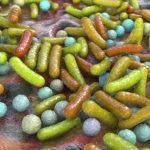By David Blyweiss, M.D.
Colorectal cancer. Sounds scary—and with good reason. Colorectal tumors strike more than one million people annually, killing 500,000 every year. The thing is, it is one of the most preventable forms of cancer and up to half of all cases could be avoided just by making some simple lifestyle changes.
First and foremost, watch your weight. Your weight (and by weight I mean fat) directly affects levels of many circulating hormones, such as insulin, insulin-like growth factors, and estrogens, creating an environment that encourages cancer development and discourages natural cell death (a process called apoptosis). In fact, every added inch of waist circumference increases your risk of colorectal cancer by five percent. The good news is that every inch you lose around your middle also lowers your risk.
While you are tweaking your diet to attain or maintain your ideal weight, it’s important to cut out sugar and refined carbs. High intakes of simple sugars (glucose, fructose and sucrose) appear to increase the risk of colorectal cancer in some studies. Animal research links sugar intake with precursors of colon cancer.
What should you eat? The Mediterranean diet has been linked to lower risk of colorectal cancer recurrence. But even a prudent organic Western diet (rich in produce, low-fat dairy, fish, lean poultry and whole grains) seems to protect against a number of cancers, including colorectal. Fruits and vegetables are especially important. Research by the University of Buffalo shows that diets rich in fruit, deep-yellow and dark-green vegetables, onions and garlic are linked to lower incidences of colorectal adenoma, a cancer precursor. And recent investigations in Canada associate eating cruciferous (cabbage-family) vegetables with lower risk of rectal cancer in women.
Exercise—30 minutes per day or more—has also proven beneficial in preventing colorectal cancer in more than a dozen studies. The Health Professional Follow-up Study shows that working out regularly cuts colon cancer risk in half. Another study by Japanese researchers found that exercise prevents the formation of tumors within the colon by supressing nitric oxide.
Supplements are also critical. In general, women who take a multivitamin/mineral are less likely to develop this cancer. Low levels of folate, riboflavin, and vitamins B6 and B12 have been linked to DNA damage and increased risk for colorectal cancers, so make sure your daily multi includes a complete B complex. The Journal of the National Cancer Institute also reports an inverse relationship between vitamin D levels and colorectal cancer mortality. I recommend taking 1,500 IU of D daily.
Are You Suffering From...
- Love handles and a pot belly
- Romance that isn't what it used to
- Forgetfulness and inattention
- Low (or no) strength and endurance
- A sex drive that's shifted into neutral...or worse
If so...you may have Mature Male Burnout. Click here to discover more about this unique condition and what you can do about it.
Spices can help, too. Research linking Cox-2 inhibitors with colorectal cancer prevention makes curcumin, the yellow pigment in turmeric (a spice in curry), a promising supplement. In addition to inhibiting prostaglandin formation, curcumin also exhibits potent antioxidant effects. I recommend taking 400 to 600 mg. of curcumin one to three times daily. Just make sure your Curcumin supplement also contains piperine for better absorption.
Finally, populate your colon and small intestines with friendly bacteria.
Probiotics like lactobacillus, bifidobacteria and propionibacter species increase your body’s ability to produce substances like short-chain fatty acids from the prebiotics in our diet that protect against colon cancer. For optimal protection, include prebiotic foods like artichokes, oat bran, onions and garlic—and take a probiotic supplement containing at least 5 to 20 billion live organisms every day.
These easy changes can go a long way toward reducing your risk. But if you are over age 50 or have a family history of the disease, it’s also important to get a colonoscopy. Nothing is better at detecting and removing precancerous polyps. And don’t believe the rumors—the preparation really isn’t that bad and the actual procedure is a piece of cake. So don’t wait—ask your doctor to schedule your screening today. It just might save your life!
References:
Aoi W. Regular exercise reduces colon tumorigenesis associated with suppression of iNOS. Biochemical and Biophysical Research Communications. 2010;399:14-19.
Shehzad A. Curcumin therapeutic promises and bioavailability in colorectal cancer. Drugs Today. 2010;46:523-532.
Wei MY. Vitamin D and prevention of colorectal adenoma: a meta-analysis. Cancer Epidemiology, Biomarkers & Prevention. 2008;17:2958-2969






